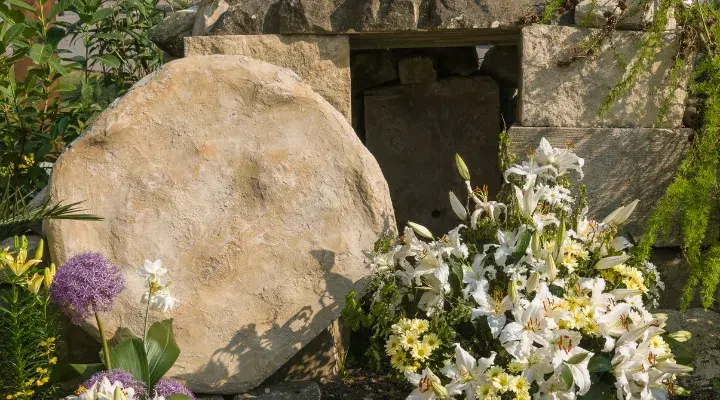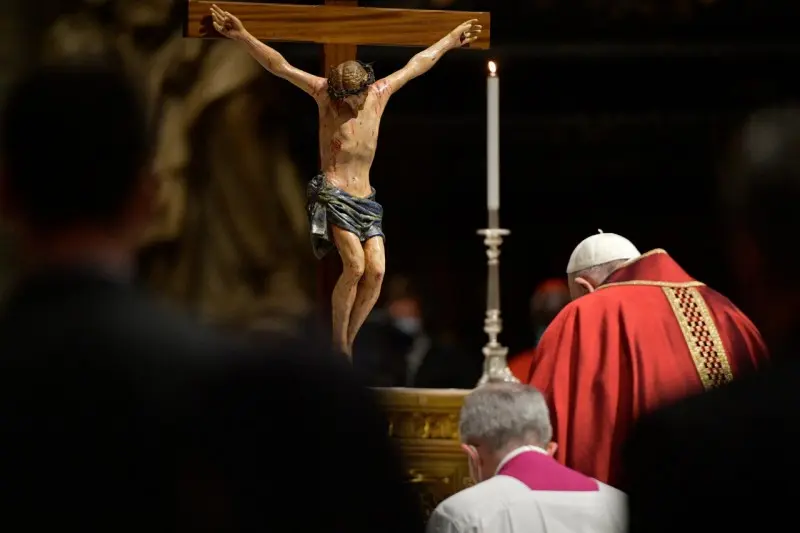
On Sunday, March 20, we celebrate Easter and begin to live the Easter Season, which begins with Easter Sunday and ends on Pentecost Sunday. After the Passion and Death of the Lord on the Cross, the glory arrives.
St. Josemaria explains in his homily Christ present in ChristiansThe Easter Season is a time of joy, a joy that is not limited to that time of the liturgical year, but is always present in the heart of the Christian. Because Christ lives: Christ is not a figure who passed away, who existed at one time and then went away, leaving us a wonderful memory and example".
The Holy Sepulcher, located in Jerusalem, is the place where, according to Christian tradition, Jesus Christ was buried and resurrected. This sacred site, venerated since the first centuries of Christianity, is considered the heart of the Christian faith, since it was there that Christ's victory over death was consummated.
For believers, the Holy Sepulcher is not only a pilgrimage destination, but also a symbol of hope and eternal life. Visiting it is a way of encountering the central mystery of Easter: the Resurrection, the foundation of Christian life. "Unless Christ is risen, our faith is in vain," adds St. Paul in the First Letter to the Corinthians (1 Corinthians 15:14).
They saw the stone rolled away and when they entered they did not find the body of the Lord. Their first reaction was fear, not looking up from the ground.
"Too often, we look at life and reality without lifting our eyes off the ground.We only focus on today, we feel disillusioned about the future and we shut ourselves up in our needs, we settle in the prison of apathy, while we continue lamenting and thinking that things will never change". Thus, he observed the Papa at the Easter Vigil held in 2022. That happens to us.
Bearing in mind that the Lord "is not here". Perhaps we look for him "in our words, in our formulas and in our customs, but we forget to look for it in the darkest corners of life.where there is someone who cries, who struggles, suffers and hopes". We must raise our eyes and open ourselves to hope..
Let's hear it: "Why do you seek the living among the dead?"We must not look for God, Francis interprets, among dead things: in our lack of courage to allow ourselves to be forgiven by God, to change and put an end to the works of evil, to decide for Jesus and his love; in reducing faith to an amulet.
"Making of God a beautiful memory of times past, instead of discovering Him as the living God who today wants to transform us and the world"; in "a christianiswho seeks the Lord among the vestiges of the past and locks him in the tomb of custom", Francis points out.
They announce the joy of the ResurrectionThe light of the Resurrection does not want to keep women in the ecstasy of a personal joy, it does not tolerate sedentary attitudes, but generates missionary disciples who 'return from the tomb' and bring the Gospel of the Risen One to all.
After having seen and heard, the women ran to announce the joy of the Resurrection to the disciples, even though they knew that they would be taken for fools. But they were not concerned about their reputation or defending their image; they did not measure their feelings or calculate their words.
They only had the fire in their hearts to bring the news, the announcement: "The Lord is risen!

We too, the successor of Peter points out, we are invited to run along the roads of the world, without fear or opportunism, to share the joy of having encountered the Lord.beyond certain formalities where we have often enclosed it, beyond comfort and well-being.
This is the Pope's Easter messageAt the end of a Lent that does not seem to want to end", between pandemics and wars.
"Let's take it to ordinary life: with gestures of peace in this time marked by the horrors of warwith works of reconciliation in broken relationships and compassion towards the needy; with actions of justice in the midst of inequalities and of truth in the midst of lies. And, above all, with works of love and fraternity".
Jesus brings us peace by carrying "our wounds". Ours because we have inflicted them on Him and because He bears them for us.
"The wounds on the Body of the Risen Jesus are the sign of the struggle that He has fought and conquered for us, with the weapons of love, so that we can have peace, be at peace, live in peace" (Blessing urbi et orbi, Resurrection Sunday, 17-IV-2022).
With the victory of Christ and with his peace, Francis will say on Easter Monday, we will be able to "come out of the tombs of our fears" (the fear of death, of fading away, of losing our loved ones, of falling ill, of not being able to go on...) (Regina Caeli, 18-IV-2022).
Also we, like the disciples on Easter morning, have every day sufficient reasons to believeJesus says to you, "I have tasted death for you, I have borne your evil. Now I have risen to tell you: I am here, with you, forever. Do not be afraid! Do not be afraid" (Ibid.).
Ramiro Pellitero IglesiasProfessor of Pastoral Theology at the Faculty of Theology of the University of Navarra.